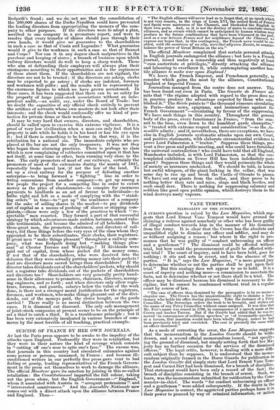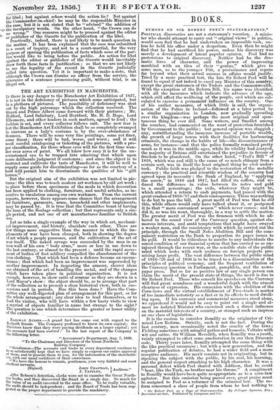VANE TEMPEST.
ILLEGALITY OF THE JUDGMENT.
A cirsions question is raised by the Law Magazine, which sug- gests that Lord Ernest Vane Tempest would have ground for claiming a redress against somebody or other who has been guilty of illegal conduct towards him in the manner of his dismissal from the Army. It is clear that the Crown has the absolute and unqualified right to dismiss any officer and soldier, and may do so without assigning a reason : but where is the right to pro- nounce that he was guilty of " conduct unbecoming an officer and a gentleman" ? The dismissal could be effected without trial, but how could the pronouncement of guilt be effected with- out trial ? The court of inquiry, said to have been held, goes for nothing ; it site and acts ur secret, and in the absence of the parties. " It is," says the Law Magazine, " a mere grand jury to determine whether or not the parties shall be put upon their trial." But this analogy does not appear to us to hold. It is a court of inquiry and nothing more—a commission to ascertain the facts, not to determine whether or not there shall be a trial. The officer may be dismissed because his dismissal s necessary to dis- cipline, but he cannot be condemned without trial in a regular court by course of law. "The case of officers thus dismissed by the prerogative is by .no means a singular one. The Crown has the unquestionable right to dismiss a func- tionary who holds his office during pleasure. Take the instance of a Privy Councillor. The Sovereign orders the book to be brought, and strikes out the name of any Privy Councillor without cause assigned. It was thus that Mr. Fox's name was erased in 1798, in consequence of a speech made at the Crown and Anchor Tavern. But if the Gazette had added that he was re- moved in consequence of seditious speeches,' or `of treasonable speeches,' at a tavern, this insertion would have been wholly illegal, unless he had been ?reviously tried and convicted. The case is precisely the same with an officer dismissed."
As a mode of correcting the error, the Law Magazine suggests that the memorandum in the London Gazette should be with- drawn, and a second official memorandum issued, " not specify- ing the ground of dismissal, but simply setting forth that her Ma- jesty has no further occasion for the services of the dismissed officers." The legal critic, however, is dealing with a more diffi- cult subject than he supposes. It is understood that the memo- randum originally framed in the Horse Guards for publication in the London Gazette did simply state- that Lord Ernest Vane Tem- pest and Cornet Birt had been dismissed, for a breach of discipline. That statement would have been only a record of the fact; the breach of discipline consisting in the breach of arrest. Such, we learn, was the memorandum submitted for ratification by the Com- mander-in-chief. The words "for conduct unbecoming an officer and a gentleman" were added subsequently. If the doubt in the Law Magazine is correct, the aggrieved parties perhaps have it in their power to proceed by way of criminal information, or action for libel ; but against whom would the action lie ? Not against the Commander-m-chief: he may be the responsible Minister in the ease, but it is not stated that he " advised" the addition of
...the inculpatory words. On the other hand, "the Crown can do no wrong." One resource might be to proceed against the editor
I* or publisher of the Gazette for the publication of the libel. Practically, indeed, there is not likely to be much question in the matter. It has been explained that the case was submitted to a court of inquiry, and not to a court-martial, for the very purpose of sparing the publication of facts which none of the par- ties would like to bring before the public. An action for libel against the editor or publisher of the Gazette would inevitably draw forth these facts inJustification ; so that we are not likely to see the legality of tie record in the Gazette judicially called into question. Yet it is important to make a note, that although the Crown can dismiss an officer from the service, the utterance of a sentence pronouncing guilt, without trial, is an illegal act.



























 Previous page
Previous page